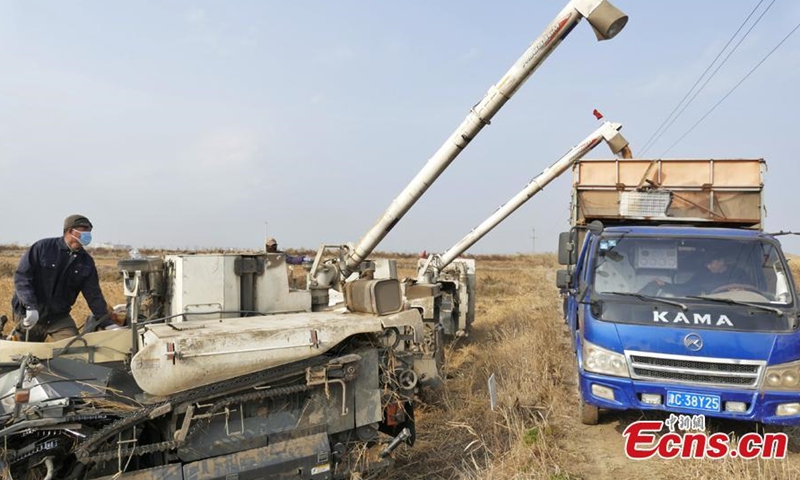
Workers harvest seawater rice developed by the late scientist Yuan Longping and his team at a planting base in Jinghai District, north China's Tianjin municipality, Nov. 15, 2021. (Photo: China News Service/Tong Yu)
Many places across China have launched a new round of saline-alkali tolerant rice - or better known as "seawater rice" - transplanting this week, aiming to increase output as the country strives to ensure food security amid an increasingly uncertain global food market.The domestic planting area of "seawater rice" surpassed 600,000 mu (40,000 hectares) by the end of 2021, and it is projected to exceed 1 million mu in 2022, the Qingdao Saline-Alkali Tolerant Rice Research and Development Center told the Global Times on Sunday.
"China has 1.5 billion mu of saline-alkali soil and 3 million mu can be improved," Wan Jili, director of the technology R&D department of the center, told the Global Times on Monday. She noted that the goal of improving 1 million mu of saline-alkali soil in 2022 will be a milestone.
Current planting areas for saline-alkali tolerant rice are distributed among seven provinces, including Northwest China's Xinjiang Uygur Autonomous Region, East China's Zhejiang and Jiangsu provinces, and Northeast China's Heilongjiang and Liaoning provinces.
Qingdao in East China's Shandong Province on Sunday kicked off the fifth transplanting festival for saline-alkali tolerant rice. North China's Inner Mongolia Autonomous Region, the Xinjiang Uygur Autonomous Region, Heilongjiang Province and Zhejiang Province also kicked off the annual transplanting at the same time.
"The species of rice we are transplanting can grow in saline water with concentrations of eight per 1,000, and its output per mu can reach about 450 kilograms, about half of the regular rice output," Wan noted. She said even though the output of saline-alkali tolerant rice is low, it is better than having nothing produced from "wasted" land.
Rice is one of the most important grain crops for Chinese people, so its output draws attention from agricultural authorities, Jiao Shanwei, editor-in-chief of industry news website cngrain.com, told the Global Times on Monday.
"China can produce about 200 million tons of rice each year at present if there are no large-scale natural disasters, and rice is slightly oversupplied in the market," he noted, adding that some countries have tightened grain exports, but their measures can hardly affect China's grain security, especially for rice.
Developed by China's "Father of Hybrid Rice" — the late Yuan Longping, the "seawater rice" is a major breakthrough in China's efforts to expand rice output.
On May 28, 2018, Yuan initiated the first transplanting festival for saline-alkali tolerant rice. After Yuan died on May 22, 2021, the Qingdao Saline-Alkali Tolerant Rice Research and Development Center, one of the places where he worked, changed the date of the festival to May 22 in order to commemorate the renowned agricultural researcher.
"Yuan's goal was to improve 100 million mu of wasted soil by planting saline-alkali tolerant rice, which means adding 100 million mu of cultivated land for the country — a noble ideal," Wan noted.
